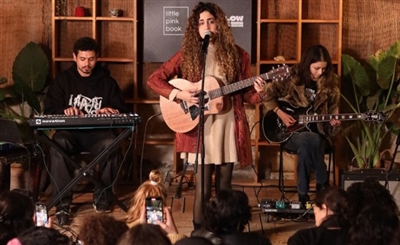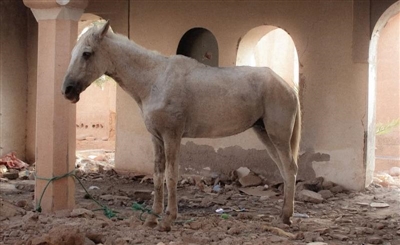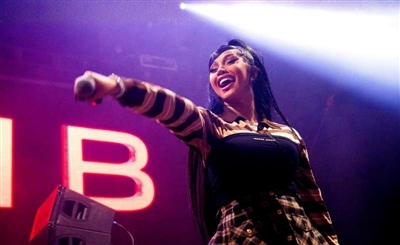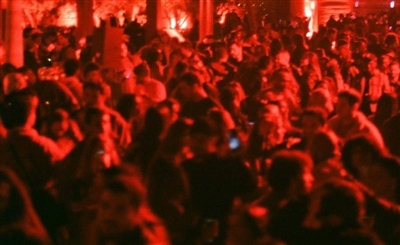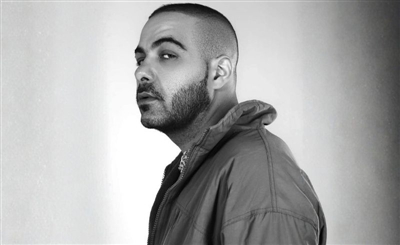Copied
An Interview with Sallam Naser: Norway's Rising Syrian-Palestinian Rapper
The jagged identities that lead one to forge his own.
Oct 07, 2019
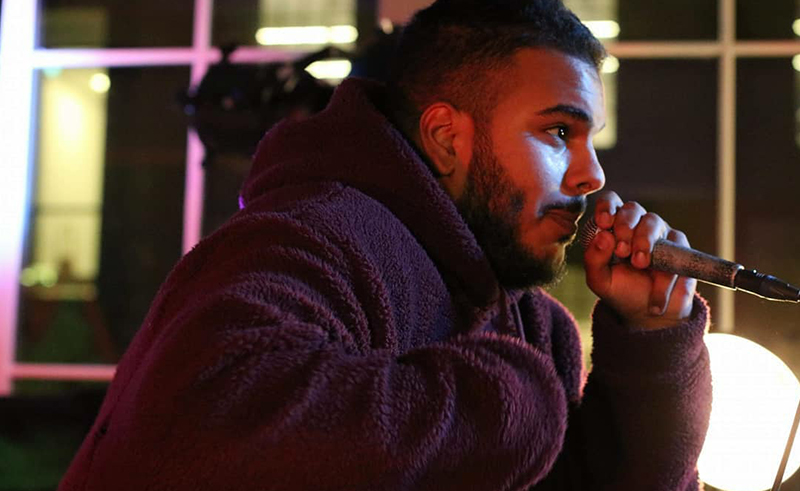
It's often times we are met with an artist whom we can't begin to describe, perhaps it's the multidimensional of their story, their work, their budding talent or their sheer determination to create and express albeit the immense internal and external struggles they not only had to endure, but trespass, only to manifest their narrative into this world. Such artist is 22-year-old Norweigan-based Palestinian-Syrian rapper, producer and word smith Sallam Nasser.<iframe width="560" height="315" src="https://www.youtube.com/embed/28N2HUFH1Ow" frameborder="0" allow="accelerometer; autoplay; encrypted-media; gyroscope; picture-in-picture" allowfullscreen></iframe>Leading a winding life in areas of political turmoil, a young aspiring Sallam eventually decided to leave his homeland, seeking asylum in Norway, with a clear aim to dive in head first into the hiphop meta, manifesting a life-long intent to have his perspective heard as a rapper, artist and producer with a story to tell. Delving into a multitude of topics while delivering versatile, masterful rap bars in both Arabic and Norweigan, a language he recently picked up, earning him attention from major publications such as BBC news. Putting out 3 solid albums, 1 EP and many singles in between in merely the period since his arrival in Drammen while forming his own Production company, Sallam's discography is certainly commendable.<iframe width="100%" height="300" scrolling="no" frameborder="no" allow="autoplay" src="https://w.soundcloud.com/player/?url=https%3A//api.soundcloud.com/tracks/687308935&color=%2334444c&auto_play=false&hide_related=true&show_comments=false&show_user=true&show_reposts=false&show_teaser=false&visual=true"></iframe>We got to interview the young rapper, ask him about his journey, his story with music, and his high octane approach towards creating critically hyper-conscious, evocative hiphop.
Ok. Sallam Naser or Naser Sallam, which is it?
My legal name is Abdelnasser Sallam, though at home and among family members, they call me Naser. My friends have been calling me Sallam my entire life. When I was creating my Facebook page, I signed up as Naser Sallam, only to realize that there are too many Naser Sallams out there, so I decided to go with Sallam Naser instead. Now, I want to be known as Sallam Naser on all platforms.
Where are you right now and what are you up to?
At the moment, I live in Drammen, Norway. All my energy lately is focused towards producing my next album. I want it to be exclusively produced by Sallam Naser, from music to lyrics. I spend huge amount of my day making new beats, for personal use and for sale to artists in Norway. I recently registered my own production company with the Norwegian government called ‘SN productions.’ The big launch of the company’s page is on it way, and I'm hoping it will be big.
Tell us a bit about your background, your life in Syria and your journey to Norway.
I am originally Palestinian from Haifa, but was born in Syria. My grandparents and family moved to Syria after the Israeli occupation. And presently, under the Israeli apartheid, I cannot even visit my own country. In Syria, they say I’m Palestinian. In Palestine, they would say I’m Palestinian Syrian. And here, in Norway, they just say I’m a "foreigner." I grew up in the Yarmouk camp, home to the biggest Palestinian refugee community in Syria. During my childhood there were many artists around me in the camp; the entire Sallam family was composed of sculptors and fine artists. I used to live my everyday life like any other kid, going to school and hanging out with friends.
In the Yarmouk camp, the topic of the Palestinian Intifada was everywhere. I grew up hearing all about it, seeing pictures of martyrs around me, and dreaming of the liberation of Palestine. A turning point for my career was my arrival at Norway, where I had the opportunity to do things I couldn’t do in Syria, like record songs with professional equipment, and make my own beats.<iframe width="100%" height="300" scrolling="no" frameborder="no" allow="autoplay" src="https://w.soundcloud.com/player/?url=https%3A//api.soundcloud.com/tracks/659812181&color=%2334444c&auto_play=false&hide_related=true&show_comments=false&show_user=true&show_reposts=false&show_teaser=false&visual=true"></iframe>Tell us about your story with rap & hip hop, what was the driving force that made you start rapping in the first place and eventually putting your stuff online?
In Yarmouk, I had a lot of friends around me that used to rap. At the time, I couldn’t write or rap, so I used to look at them and envy what they did. I started putting a lot of effort into writing my own spoken word poetry. And then, at 12 years old, I received an award for best spoken word poetry. After that, I started practicing my rap and writing more, and freestyle with everyone around me that was willing to. I didn’t particularly have the resources to record back then so all I could basically do was practice on my own while listening to other people’s music. After I left the camp in 2013, I started writing more consistently; full songs rather than just words for fun. I started looking for studios to record my songs in, and I came out with my first track in 2014 with my friend Rasool as part of our rap group 'Kaza'.
The track we released got a lot of attention and positive feedback. Despite not being able to record as much as I wanted to, I kept freestyling, rapping and practicing my writing everyday. I started to understand rap better, and see that rap is more than just dropping tracks and making music; it’s a form of resistance. In 2015, when I moved to Norway, I finally started recording songs professionally. My first official track under the name of Sallam Naser was released in 2017, 'La Chou2'.
How is your message and your sound as an Arab Syrian-Palestinian rapper perceived in Norway and Europe? Is it celebrated? has there been setbacks?
Right now, I am the only rapper in Norway who raps in Arabic and has an audience. Arabic rap is not popular there, and I mainly depend on the Arabs around me and abroad for support. At the same time, there are a lot of Arabic speakers who come to my events and love my music; even those that aren’t rap fans. Trying to organize concerts and events that bring people together of the same culture and background was challenging at first, but worth the trouble.
You've released 3 albums, an EP and a number of singles, how do you feel your work evolved throughout these releases?
Sometimes I feel like it all went too fast; I dropped my albums one after the other in a short period of time, made songs in a day or less and released them instantly. For now, I decided to give myself and my team more time for the next album, so we can focus on every detail and make it as good as I imagine it to be. I’m someone who always tries to innovate and push myself out of my comfort zone, and I feel like every track I made and the ones I will make in the coming year are practice for the next album.<iframe width="100%" height="300" scrolling="no" frameborder="no" allow="autoplay" src="https://w.soundcloud.com/player/?url=https%3A//api.soundcloud.com/playlists/704555088&color=%2334444c&auto_play=false&hide_related=true&show_comments=false&show_user=true&show_reposts=false&show_teaser=false&visual=true"></iframe>Tell us about your last album Jabr Al Kisr and the concept behind it, in terms of theme and lyrics?
In Jabr al Kisr, I try to paint an image of Syria and the camp exactly like I remember it. I have seen a lot of people talking about Syria and portraying everything as "perfect". What I try to do is represent it as accurately as I remember it. My lyrics in every track were honest and straightforward; nostalgic but realistic. I want anyone who listens to the album, whether they’ve lived in Damascus or not, to imagine it the way I see it.
You've collaborated with prominent names in the Arab hip-hop scene such as Al Nather, El Rass and Synaptik, what were those experiences like? and what did you learn from them?
The Arab rap scene is small and we all share struggles and social stances; that’s what I like about being part of it. This means that when you work with someone, you both learn from each other and help one another grow. Each rapper I worked with has a different style and a different methodology of work which taught me a lot.<iframe width="100%" height="300" scrolling="no" frameborder="no" allow="autoplay" src="https://w.soundcloud.com/player/?url=https%3A//api.soundcloud.com/tracks/519646527&color=%2334444c&auto_play=false&hide_related=true&show_comments=false&show_user=true&show_reposts=false&show_teaser=false&visual=true"></iframe>You're very lyrically gifted, when did you start noticing that?
I noticed this when I started rapping around others, and saw that my way of writing was different from anyone else’s. I saw some people who deliver a nice flow with no meaning or substance to their rap. Personally, I try bring together a lot of ideas in the same sentence or bar, linking them throughout the songs I make. From a lyrical point of view, I try to make my rap relatable and accessible as much as I can, so that anyone can understand me and relate to the events I depict. The beats and lyrics I make often come across as effortless, but I actually a lot of effort is put into them; that’s called “السهل الممتنع” in Arabic.
Tell us a bit about your involvement with the rap battle scene in Norway, how has that experience been like, how many battles have you participated in and how many have you won?
I participated in four battles in Norwegian so far, and I won four of them. In a couple of months, I have the final battle that defines who the best battle rapper in Norway is. I can’t legally leave Norway before I get the nationality, and so I cannot travel to participate in Arabic battles. As an alternative, I decided to make it my mission to learn the Norwegian language only so I could participate in battles.
It was honestly a great experience, and different from anything I have ever done. It made me create my own style in battle rap, and equally it is getting me ready to participate in future rap battles with fellow Arab rappers – hopefully very soon.<iframe width="560" height="315" src="https://www.youtube.com/embed/eWNyvRtDUnY" frameborder="0" allow="accelerometer; autoplay; encrypted-media; gyroscope; picture-in-picture" allowfullscreen></iframe>You've been rapping in Norwegian, a language you recently learnt, against other Norwegian rappers, how did you pick up the language and rap with it in such a short time, and how is it like rapping in your non native language?
I learned the Norwegian language easily, because I’m a very sociable person, and I used this to talk to as many people as I can and practice the language. I also tried to read Norwegian books, which was hard and took a lot of effort. Learning a language is easier when you have a goal and a passion behind it – For me it was battle rap.
Which Arab rappers were you listening to growing up? And was there someone specific who had a strong influence on you?
I used to listen to Khaliji rap in my growing up, but it did not influence the music I make now in anyway, as I now realize it is rather superficial. Big rap figures, such as Kendrick Lamar, have a very big influence on my music to this day.
You're very driven, consistently putting one release after the other, how do you find the urge to be quite pro-active about your music?
I am goal-oriented, and the goals I set for myself are non-stop, one after the other. So let’s say I write a song, and record it in an hour, that – to me – doesn’t mean I get to rest or focus on something else. It just means I have to find something new to do next: a track, a beat, a battle preparation. My songs are basically just my every day thoughts and feelings, translated musically and lyrically, meaning that they never stop and I cannot physically take a break from them.<iframe width="560" height="315" src="https://www.youtube.com/embed/tqYfai9vBX0" frameborder="0" allow="accelerometer; autoplay; encrypted-media; gyroscope; picture-in-picture" allowfullscreen></iframe>
Let's put rap aside for a second, when did you get into music production? and do you intend to only produce for yourself or do you want to produce for others as well?
A year and a half ago, I decided to buy the equipment and start producing music. I learned everything on my own, through observation and a lot of practice. I sat with Norwegian producers and watched what they did, step by step. They all inspired me to keep moving forward, and do more than just lyrics. My first official release is the EP Tarek Majal, followed by my latest song ‘Trap.’ From now on, expect nothing but beats produced by me. I am also looking forward to produce for other artists around me as well.
Tell us about your upcoming album, what can we expect from it? And when will it be released?
My next album will contain more tracks than any of the previous ones. I am spending more than six hours per day in the studio, producing music, writing lyrics, and again practicing. Since this is the first album fully produced by me, I am putting my soul into it. Although I'm still unsure about the release date, I have hopes that it will be one of the biggest hits in the Arab scene.
- Previous Article Getting Abyusif
- Next Article 23 Must-Watch Middle Eastern Music Documentaries



